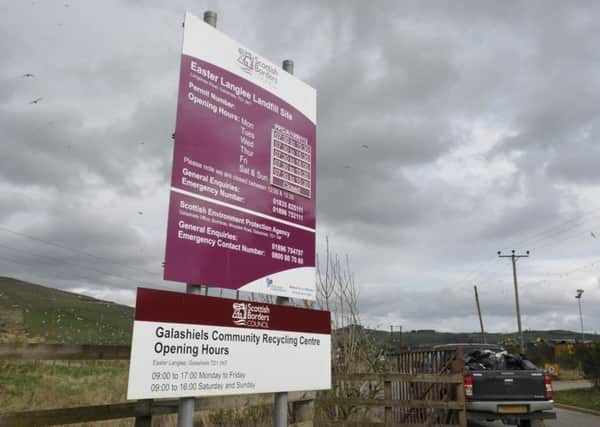Seven wasted years as recycling drops in Borders


This compares to the 39.27% in the corresponding quarter of the previous year and reflects the decision of Scottish Borders Council to abandon urban kerbside collections of garden waste in April last year.
According to SBC’s unaudited accounts for 2014/15, the reduction was “in line with predictions”.
Advertisement
Hide AdAdvertisement
Hide AdBut it places the council well adrift of meeting the Scottish Government Zero Waste target for local authorities to recycle 70% of all waste by 2025.
Hitting that deadline is just one of the challenges facing the small group of council officers and elected members set up last month to develop a new waste management strategy.
The green bin withdrawal was a key component of a previous strategy, launched at the end of 2013 and predicated on a 2012 deal with New Earth Solutions (NES) to provide an advanced thermal treatment facility (ATT) at Easter Langlee in Galashiels.
That contract was scrapped in February this year, forcing SBC to write off the £2m it had spent on the abortive procurement process and go back to the drawing board.
Advertisement
Hide AdAdvertisement
Hide AdAround £300,000 of that money went to consultant Barry Phelps, whose company D & P Management was engaged by the council from 2008 until 2011 to procure a solution for the estimated 65,000 tonnes of waste generated annually in the region.
Mr Phelps had, in 2011, brokered a contract for the council with NES for a giant composting plant at Easter Langlee which, he claimed, would prevent 80% of waste going to landfill and meet recycling commitments.
It was in October, 2012 that the council made the ill-fated decision to agree a deed of variation for NES to simultaneously provide the incinerator-based energy generating ATT.
Mr Phelps said this week that the council had “in effect, wasted seven years” in finding a way to not only hit recycling targets but also meet the impending deadline of 2021 for a ban on all biodegradable waste going to landfill.
Advertisement
Hide AdAdvertisement
Hide AdHe predicted that, whatever option the council now chooses, it will be much more expensive.
Mr Phelps said only three practical choices faced the council – constructing and operating its own facility which would be financially prohibitive; re-tendering for a new provider with the risk of failing to attract any commercial interest; or transporting all waste out of the Borders.
“The cost of such transport could be in the region of £1m a year based on previous estimates for using sites in Edinburgh and Dunbar in East Lothian, where the gate fees are much higher than agreed under the original NES deal,” he said.